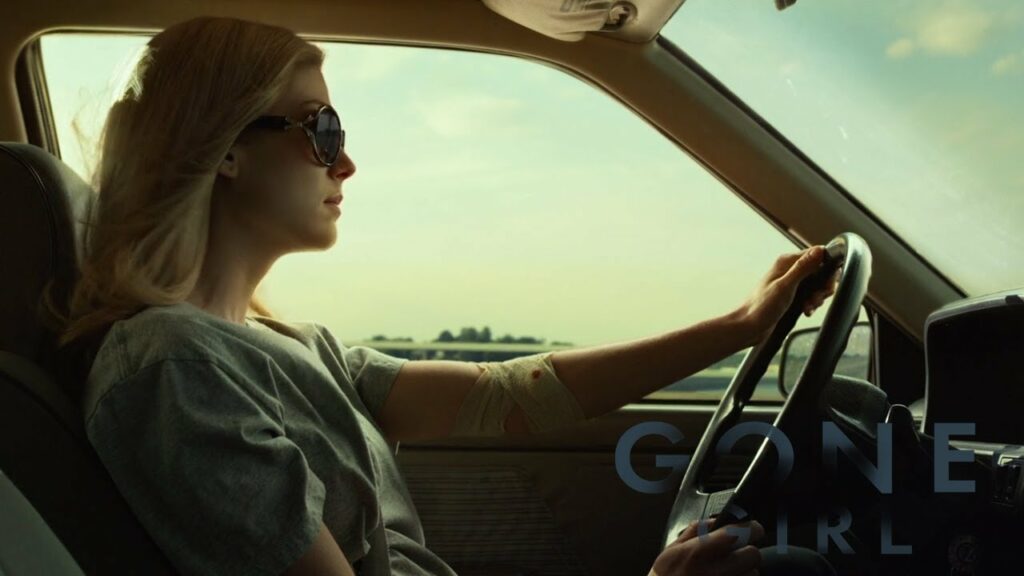
Today, we look at the semi-controversial aspects of the “Cool Girl” speech in Gone Girl.
This is To Quote a Phrase, a spotlight on notable pop culture quotes.
October is a Month of To Quote a Phrase, both here and at Comics Should Be Good!
GONE GIRL SPOILERS AHEAD!
There are a lot of things for people to remember of Gone Girl, the hit film adaptation of Gillian Flynn’s novel of the same name, but the main thing people seem to remember is also pretty much the ONLY thing they remember from the novel it was based on, which is Amy’s “Cool Girl” speech (the speech gets shared a LOT).
Amy Dunne (Rosamund Pike) has just revealed to the audience that she faked her death, a death for which her husband, Nick Dunne (Ben Affleck), is seemingly going to be convicted for.
She then explains to the audience that she and Nick were never REALLY happy, as he just loved a fake version of herself that she created for him, the “Cool Girl.” She notes:
Nick and Amy will be gone, but then we never really existed. Nick loved a girl I was pretending to be. “Cool girl”. Men always use that, don’t they? As their defining compliment: “She’s a cool girl”. Cool girl is hot. Cool girl is game. Cool girl is fun. Cool girl never gets angry at her man. She only smiles in a chagrined, loving manner. And then presents her mouth for fucking. She likes what he likes, so evidently he’s a vinyl hipster who loves fetish Manga. If he likes girls gone wild, she’s a mall babe who talks for football and endures buffalo wings at Hooters. When I met Nick Dunne I knew he wanted “Cool girl”. And for him, I’ll admit: I was willing to try. I wax-stripped my pussy raw. I drank canned beer watching Adam Sandler movies. I ate cold pizza and remained a size two. I blew him, semi-regularly. I lived in the moment. I was fucking game. I can’t say I didn’t enjoy some of it. Nick teased out in me things I didn’t know existed. A lightness, a humor, an ease. But I made him smarter. Sharper. I inspired him to rise to my level. I forged the man of my dreams. We were happy pretending to be other people. We were the happiest couple we knew. And what’s the point of being together if you’re not the happiest? But Nick got lazy. He became someone I did not agree to marry. He actually expected me to love him unconditionally. Then he dragged me, penniless, to the navel of this great country and found himself a newer, younger, bouncier cool girl. You think I’d let him destroy me and end up happier than ever? No fucking way. He doesn’t get to win. My cute, charming, salt-of-the-earth Missouri guy. He needed to learn. Grown-ups work for things. Grown-ups pay. Grown-ups suffer consequences.
First off, great quote, right? So obviously, right there, we’re technically done (not Dunne), but I think it’s fascinating to look at HOW the quote has been received over the years.
Here’s the scene in the movie…
Note that the women Amy is looking at with disgust are pointedly women who are WITHOUT MEN. Obviously, the intent of the scene is that Amy is looking at these young women with disdain for trying to be “cool girls,” but, again, they’re not with men. They’re not performing in front of men. They’re just…having a good time. So therefore, is director David Fincher accidentally undercutting Amy’s point by not showing women being “Cool girls,” or is Fincher INTENTIONALLY undercutting Amy’s point by showing that this is just a woman who hates things PERIOD, not with a rationality.
Amy Dunne is obviously the villain of Gone Girl. Her husband, Nick, is not a good guy, either, but he’s not the villain of the film. Amy is. Therefore, I do not think the film is really endorsing her “Cool girl” quote as some great feminist critique of society. At the same time, even a villain can make a good point without them NOT being a villain. So if you think that there is some merit in some of what Amy says about men wanting some impossible level of “cool” from the women that they’re interested in, then that’s fair enough. If you think Amy is just being a jerk to women, then that’s fair enough, as well.
It’s a fascinatingly well-presented speech from a twisted character, and the fact that this comes right after we learned that she faked her death (after seemingly being dead for nearly half the movie) makes it stand out more in our minds, as it is attached to that shocking moment that we learn that she is not only not dead, but that she has framed her husband for her murder.
Film history is littered with people treating villains as heroes, but it is an interesting question as to whether citing a position from a villain is necessarily a bad thing if you think a bad person just happens to make a good point.
Okay, folks, if you have notable quotes from TV, movie or music that you’d like to see me spotlight this month, drop me a line at brian@poprefs.com!










I haven’t read the book or seen the movie, but I did catch the author Gillian Flynn on Velshi’s Banned Book Club. So take my comments for what they’re worth.
Amy’s rant about Cool girls is a gross generalization, just like the notion that women are from Venus and men are from Mars. For the record, I’ve been married three times, and each of those women was very different. I was married to the second for ten years, and we remained good friends until her death. I’ve been married to the third for forty years. Both of those women changed considerably over those years.
For that matter, so did I. My wants, needs and desires changes as I got older. I was certainly more willing to compromise, that is to say, physical attraction became less important to me. Anyone who doesn’t change over the course of their life is a fool incapable of learning from their mistakes.
In my experience, and what I perceive from observing the lives of my siblings and friends, is that in the initial stages of a relationship, women tend – and I stress tend – to be more reserved, that is to say, less willing to expose their true selves, in order to please the object of their affection. Seems to me, Amy is saying the same thing about Cool girls in her rant.
But eventually, the real person emerges, and that can come as a shock to the other party, especially if they were attempting to present their true self (at least at that point in their life) from the beginning of the relationship. The halo effect is a well-known dynamic, especially among marriage counselors. The first two years or so in a relationship are often filled with excitement and surprises. If that wasn’t so, the relationship probably wouldn’t last two years.
But it isn’t possible to maintain that elevated emotional state over the long haul; not when bills, babies, and boredom begin to intrude in that relationship. Marriage is entirely different from courtship, to use a word not much in fashion these days. An old adage applies: “Kissing don’t last, but cooking do.” Or to resort to one of my own: Courtship is a feast; marriage is three square meals a day.
As I said at the outset, take my opinions for what they’re worth, and please forgive me my sins and generalizations, for I am a man from Mars.